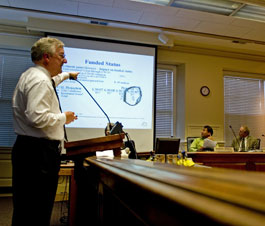home | metro santa cruz index | currents

Photograph by Curtis Cartier
BARTELL ALL: Actuary John Bartel explains to City Council why it's in the red.
Big Bowl of Bad
Forum yields smorgie of unpalatable ideas on reducing city employee pensions
By Curtis Cartier
THERE WAS a point during last week's "Pension Reform Study Session" at City Hall when even Santa Cruz Mayor Mike Rotkin—a self-described socialist and champion of entitlements—had to admit that "scaling back pensions may be inevitable." Looking at the numbers, there seems little room for argument. As it stands, Santa Cruz's retirement pension plans have $37 million in unfunded liability, meaning that the retirement benefits promised to the city's 762 cops, firefighters, maintenance workers, analysts and other regular employees will cost $37 million more than what the plans are actually worth. "Unfortunately, we can't print money," Rotkin later lamented. "Only the federal government can do that."
The late evening study session was an attempt to hear fresh ideas on how to trim the retirement benefits of city employees without either ending up in court or sparking a mass employee exodus. The buzzword of the night, as in most pension reform debates statewide, was "two-tier," as in "two-tier retirement plans." A simple concept, two-tier essentially means two levels of retirement compensation for employees—one for current employees who have already been promised a legally bound amount of compensation, and another, skimpier offering for employees hired from now on.
In California, where nearly every public employer, including the city of Santa Cruz, uses the California Public Employees' Retirement System, or CalPERS, 16 municipalities, including the cities of Menlo Park, Santa Rosa, Ventura and Palo Alto, have either enacted a two-tier system or are on the brink of doing so. The major problem with the two-tier solution, however, is that its cost savings are decades away and even then, fairly meager. John Bartel, a professional actuary hired by the city to chart a financial course through the pension storm, estimates that if the city begins hiring public safety employees at a 1 percent lower pension rate and non–public safety employees with a five-year increase to their minimum retirement age, it will take 10 years before the savings will top $1 million per year.
Between now and then, labor unions are all but guaranteeing that if the reforms are enacted, any new employee worth keeping will jump ship as soon as he or she can find a city, county or private enterprise with better benefits, and any employees left over will be jaded at working alongside people who do the same job but get better benefits.
"At some point, the economy is going to get better, and if [a neighboring city] kept maintaining those benefits, they are going to be in a better position to recruit and keep those employees," says Don Dietrich, a representative for the city's operating engineers. "It's kind of like professional sports these days. If someone down the street has a better offer, they'll pack up and go."
A two-tier system is not the end result of pension reform, but rather the most popular means by which to enact it. Whatever plan is offered as the "second tier" is where any actual savings lie. On that end, Mayor Rotkin says he's open to bumping the minimum retirement age (50 for cops and firefighters, 55 for other employees) back between three and five years. Dietrich says a better choice is to increase the amount of money employees pay into their own retirement plans. John Gilbert, a Service Employees International Union member, says he favors temporary cuts like furloughs and cost-of-living raise deferments. Bartel maintains that all three ideas, along with cuts to the actual rate at which retired employees are paid, should be on the table. And meanwhile, an oft-cited Stanford University study into California's hemorrhaging retirement system even suggests privatizing the entire affair into market-based 401(k)-style accounts. And while no final decisions have been announced by city leaders yet, it seems a forgone conclusion that the new generation of Santa Cruz employees will likely be looking at a much different picture when they retire than the current generation does. "There is no easy fix," Bartel warns. "The money simply isn't there."
Send letters to the editor here.
|
|
|
|
|
|